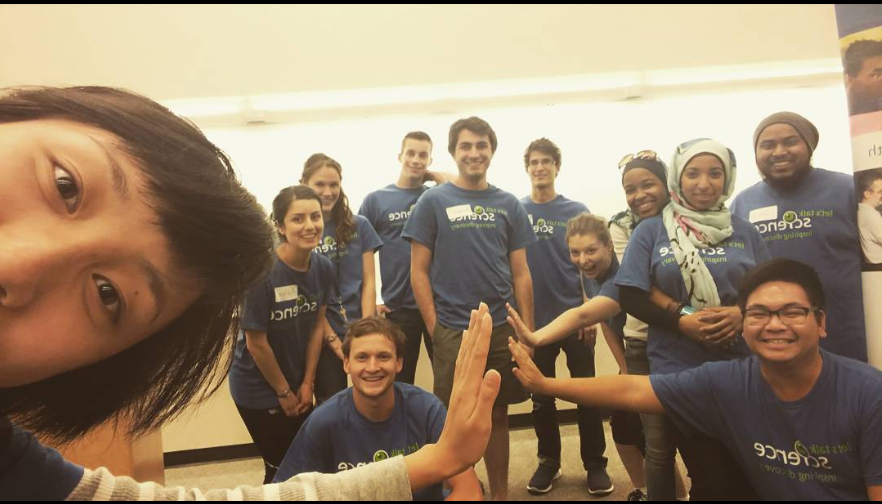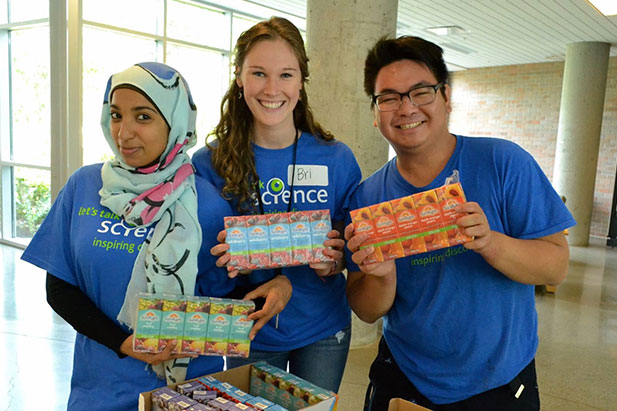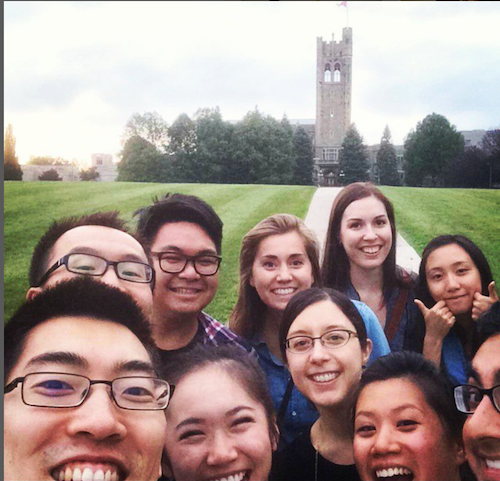Connection, Compassion, and Community: Mannix Chan and Let's Talk Science

Mannix Chan is currently a Student Engagement Coordinator at York University in the Faculty of Liberal Arts and Professional Studies. But before he was working with arts students at York, he was building connections and skills at Let’s Talk Science. First, as a volunteer, then a site coordinator, then the regional coordinator for Western Canada, many of Chan’s formative experiences were forged in the Let’s Talk Science family.
Chan first joined Let’s Talk Science as a volunteer while an undergraduate student, completing a Bachelor of Science degree in forensic science at Ontario Tech University. He was president of the Forensic Science Society, through which he got involved in Science Rendezvous, which led him to Let’s Talk Science. He remembers his time volunteering at Ontario Tech quite fondly: “Being in front of kids and being able to inspire kids and work with other people who are passionate about the same things you’re passionate about was really inspiring.”
After finishing his undergraduate degree, Chan had every intention of continuing his pursuit of science at the graduate level, even applying for an MSc/Ph.D. program in Australia. However, when funding for his spot fell through, he had to reevaluate. “I was very involved on campus as an undergraduate student: science council, forensic science society, the ambassador program, the mentorship program, etc. That was the stuff I was really motivated and inspired by,” says Chan. “All my friends were doing co-ops or volunteering in labs, hospitals, and clinics. So when I took a step back and looked at my resume, it didn’t scream ‘Science’ with a capital ‘S.’ I had to reevaluate and ask: is this something I really want to do?” After talking with professors, advisors, and friends, Chan decided to pursue a Master of Arts in Leadership Studies at the University of Victoria.
Chan quickly discovered the UVic Let’s Talk Science outreach site after arriving to begin his MA, where he started volunteering once again before quickly becoming site coordinator. “It was kind of serendipitous a little bit because my Master’s was looking at leadership education,” reflects Chan. “Through my Let’s Talk Science Coordinator role, I was able to align my studies and my extracurriculars.” While he has many great memories of his time as Site Coordinator, Chan is particularly fond of his experiences at the Let’s Talk Science National Outreach Coordinators’ Training Conference. “It was cool to be in a room with other folks who were so passionate about the work they did,” says Chan. “Everyone was really passionate about STEM, being a site coordinator, and just being a part of Let’s Talk Science. The energy in that room was always so contagious. It also allowed you to meet new friends from every major city across the country.”
After graduating from UVic, Chan took a full-time position at Let’s Talk Science as the regional coordinator for Western Canada. Based in Calgary, he spent four years in the role, helping to facilitate programming and supporting outreach sites across Western Canada. “When I became the regional coordinator, I was able to travel Canada quite a bit. I’ve probably been to places most Canadians don’t even have on their bucket list,” says Chan. “It was exhilarating just seeing different parts of the country and seeing what’s out there.” From volunteer up to regional coordinator, the best part of Chan’s experience was always getting to do what he was passionate about: “I am really passionate about volunteerism and leadership development, and I got to do that as a coordinator and as a regional coordinator.”
Now, as Student Engagement Coordinator at York University, he draws on the skills and expertise he built during his time at Let’s Talk Science. “As a Student Engagement Coordinator at York University, a lot of my job is still kind of similar to what I was doing as a regional coordinator and as a site coordinator,” Chan says. “It focuses on opportunities for students to develop their leadership, personal, and professional skills.” Chan credits Let’s Talk Science for helping to prepare him for the responsibilities he now carries: “I think my role as a regional coordinator prepared me for this because Let’s Talk Science gives coordinators–and their volunteers, for that matter—a lot of autonomy.”


Going forward, Chan hopes everyone can keep an open mind when it comes to STEM and science education, whether they are an educator or a student. “I always tell volunteers and coordinators: you don’t know what that kid’s been through when they enter the classroom,” Chan says, stressing the importance of compassion in the classroom. “They sometimes come from very bad situations, and in the classroom, that’s their one opportunity to just be a kid.” He encourages people, especially teachers, to think more holistically about what it means to be a student, especially in an age of so much uncertainty. “Unfortunately, in this day and age, we politicize everything, including science,” says Chan. “I think it’s important for everyone to have a basic foundation in science to help them try and make sense of everything going on around them, from the COVID-19 pandemic to the ongoing climate crisis.”
Chan urges students to reflect on their passions and consider all their options. “I work with many different students in the liberal arts faculty, so programs like criminology, political science, and law are all housed in my faculty. I often hear these students saying things like: ‘I need to become a lawyer,’ or when I used to work with science students: ‘I need to become a doctor,’ but these are not the only paths they can take,” says Chan. “I would encourage students to think about what they actually enjoy and what they want to do.” He stresses the number of opportunities available to students and encourages them to explore different options, especially those that may be non-traditional paths associated with their degree. “Even the people at Let’s Talk Science, if you ask them, many will tell you one of the reasons they are at Let’s Talk Science is because they really love science but didn’t necessarily want to be stuck in a lab,” points out Chan. “I appreciate Let’s Talk Science so much because it allows science students to explore different avenues while still being rooted in STEM.”
Let's Talk Science is celebrating our 30th Anniversary and we are excited to continue making an impact in the lives of children and youth across Canada for another 30 years - or longer.
Join us in shaping the future by contributing to our fundraising goal of raising $30 Million in three years from industry, individuals and foundations through our Inspire – Educate – Innovate Fundraising Campaign. Together, we can continue to make a difference.